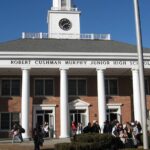Environmental Disinformation 101
Durham, N. C.—By every conceivable measure, the environment is getting better, not worse, with time but most college professors are reluctant to acknowledge the improvement, particularly on their own campuses.
“There is no evidence of global warming, no evidence of species extinction and we have more forests than in Columbus’ time,” says Alston Chase, the author of Playing God in Yellowstone. “These are all true statements that are taboo in academia.”
Chase spoke at a conference here sponsored by the John William Pope Center for Higher Education Policy. A senior fellow with the Pope Center, Chase has researched the environmental movement—national and international—for at least two decades.
The veteran author and educator has seen just about every trend in Academia over the past half-century but even he finds himself continually surprised by the manner in which traditional academic principles get turned on their head in today’s Ivory Tower.
At an academic conference in Montana, where he resides, Chase discovered to his dismay that his colleagues did not view truth the way he did, namely as something objectively verifiable. Rather, they saw truth as something that could be used to achieve an end.
Chase took his leave of the conference in order to make another engagement. He later learned that National Public Radio listeners could hear the other panelists complain about him in his absence in the taped proceedings of the event on NPR.
“There is a degree to which these rules are ad-hoc because they are brought about by pressures from individual groups,” Chase said. The author of Harvard and the Unabomber: The Education of an American Terrorist is no stranger to pressure groups: He was on the scene in Europe when the environmental movement there discovered global warming.
“Up until the 1990s, the Europeans hardly knew what global warming was,” Chase told the crowd at the Hilton. “It became an issue when the Berlin Wall came down.”
“I happened to be in Germany at the time,” recounted Chase. “Die Gruenen, or The Green Party, had said that not only was East Germany a workers’paradise but also an environmental paradise.”
“When the Wall came down and people could see that the Elder River was so polluted that you could walk across it, that myth was blown,” Chase remembered. “They [the Green Party] had a conference to decide what they were going to do and latched onto global warming.”
With degrees from Harvard, Princeton and Oxford, Chase served on the faculty or as a fellow at several colleges and universities, including Macalester College in Minnesota and the University of Maryland’s School of Public Affairs. He is currently at work on a memoir entitled Withdrawal and Return: Reflections on a Life in Education and the Origins of the Uncivil Society.
Chase recalls that the Left’s dominance of higher education goes back a long way, at least to the time when he considered himself politically liberal. He regaled the audience at the Pope Center’s annual conference with his memories of serving on a college faculty during the 1964 presidential contest between liberal Democrat Lyndon B. Johnson and conservative Republican Barry Goldwater.
“While teaching at Ohio State University in the 1960s, I had a bumper sticker that read, Bury Goldwater and was shunned by colleagues until one took a close look at it and said, ‘Ah, it says Bury Goldwater, we thought it said Barry Goldwater.’”
“Would you like to go to a party?,” the colleague asked Chase, assured that the urbane professor was “politically correct” decades before that term became widely used.
Malcolm A. Kline is the executive director of Accuracy in Academia.




